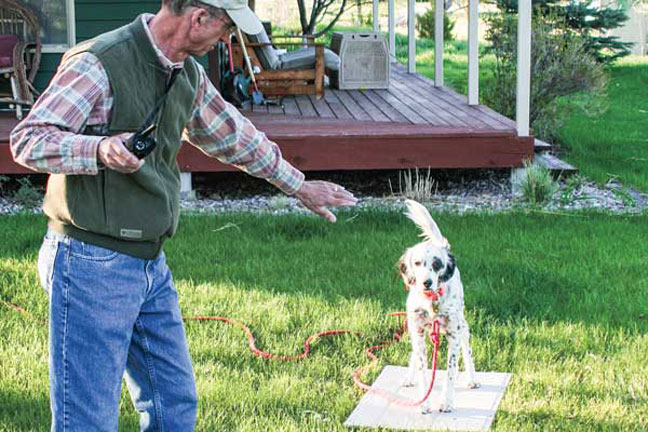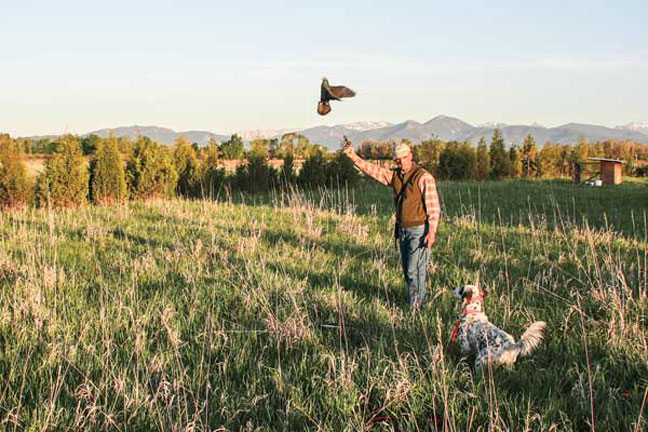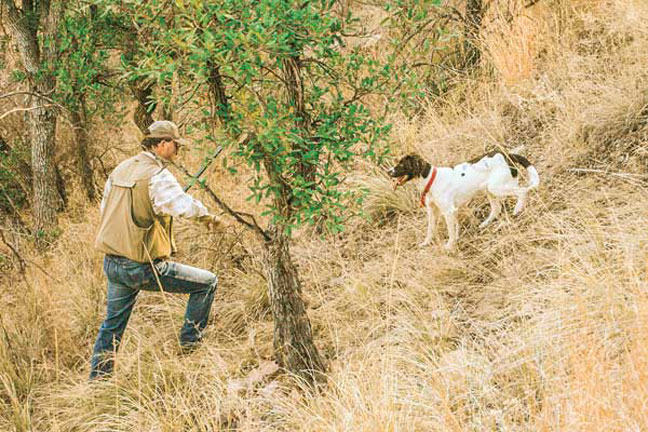Full Disclosure: Sometimes I lose my temper and scream at my dogs. I don't own perfect dogs, and as numerous people who know me will be only too happy to testify, I'm not perfect, either.
But I think I've managed to learn a few things from the encyclopedic catalog of mistakes I've made over the years and the mistakes I've watched other people make.

Handling a pointing dog effectively (directing him in the field in a way that enhances his training and natural hunting ability) isn't that difficult, but you'd never know it from watching the average bird hunter.
Standard procedure: if the dog doesn't do what he wants, he screams at it. It makes the handler feel like he's helping or taking control, and sometimes screaming does work. But the problem is, many people continue to scream at their dogs, making things worse. I know from experience.
To keep things simple, let's say you haven't yet trained your pointing dog to whoa. If he decides to bust a covey in the field, will yelling at him to whoa make him stop? No. OK, let's say he busts another covey, and this time you yell at him a little louder. Will he whoa? No. One more time. Your dog busts yet another covey and this time you take off the gloves and scream at him for five minutes. Think he'll finally understand? No.
So the first requirement of handling your pointing dog effectively is to train it effectively. Your dog can't obey a command in the field that he doesn't know (or knows but doesn't completely understand). There are plenty of good ways to train a dog, but the one common denominator is that the lessons learned during scheduled off-season training sessions are adhered to and reinforced in the field. I know, it's tough. You'd rather shoot birds. So would I. And I know what you're thinking. It would be so much easier if my dog would just do what I want it to do. Brother, you won't get an argument from me. But that's simply not the way it usually works. On a real hunt, as opposed to a training session, dogs almost always choose to ignore what they've learned if they think they can get away with it. That's just the way they're wired.
One More Chance
If you want, you can give your pup the benefit of the doubt. It probably won't work, but you can try. The next time he's working a bird and all amped up and excited, give him one of the commands he knows—for instance, the "whoa" command.
He'll ignore you. So what do you do then? The first infraction is a freebie. But the next time he ignores you, correct him on the spot.

You won't make him bird shy, because if you've done a thorough job of training him over the summer, he'll know exactly why he's being corrected, and he'll learn one of the most important lessons he needs to know, that the commands he's been trained to perform apply on hunts, too.
There's another reason continually yelling at your dog is counterproductive. Again, we'll use me as an example. I was a headstrong kid. The more my parents screamed at me, the more I tuned them out. Yada, yada, yada.
Didn't make the slightest bit of difference that whatever it was they were screaming about was probably right (I didn't figure that out until well into my adult years, but there you go). I knew just how far I could push them until I got reprimanded. So does your dog. If you customarily yell at your dog six times before you correct him for disobeying a command, he'll learn at warp speed that he doesn't have to pay attention to anything you say until you've said it six times. But if you tell him once (twice tops) and then enforce the command with a correction, he'll get the idea, and quickly. Think of it! You've just saved yourself several seconds of useless yelling.
Whistle-Blower
In the same way that constantly yelling at your dog teaches him to ignore you, constantly talking to him while you're hunting does the same thing. People who continually talk and whistle at their dogs drive everyone around them nuts. I've noticed that this is more common among those who are involved with, or know people who are involved with, field trials of just about any kind.
Don't get me wrong. I like and respect field trialers; they're my kind of people. They breed great dogs, and those breedings filter down to the hunting dogs I buy. But why they seem compelled to continually talk to their dogs while they're hunting, as opposed to trialing, is something you'll have to get them to explain to you. I don't get it.
Finally, one of the hardest things to learn about effective handling, and an area of my own handling that I continually work on, is learning to determine when your dog is making a mistake he may benefit from, and when he's simply giving you, so to speak, the paw. Inexperienced dogs and puppies make a lot of mistakes.

Punishing them or screaming at them for making an honest mistake won't teach them a thing. But allowing them to make that mistake allows them to learn.
Although there are exceptions, most dogs want to do the right thing. If your young dog pushes a bird a little too hard and bumps it, will yelling at him or correcting him make him more cautious? Nope. That's something he has to figure out on his own. Yeah, it's no fun when a perfect opportunity for a shot flies away, but dogs aren't any more perfect than their owners.
Even experienced, seasoned pointing dogs bump birds, because bird behavior simply isn't predictable. A young dog, or an older dog who hasn't been hunted much, needs to learn what his personal boundaries are.
He needs to learn to use his own judgment about how close he can get to a bird before he points it, not yours; he needs to learn how far he should range to effectively hunt birds in the terrain he's hunting; and he needs to do these and other things without a lot of pointless chatter from you, which just distracts him from the job at hand.
So, am I saying you should never yell at or talk to your dog? Nope. If you keep your chatter and yelling to a minimum, it will have that much more impact when it really matters. For instance, when he's about to run onto a busy highway and your command "whoa," barked at the top of your lungs, stops him in his tracks.
Or, not least, when he's made a perfect point, you make the shot, and he delivers the warm bird to your hand. That's when telling him what a good boy he is will make him want to please you that much more.
One thing is for sure — if you can't stop your dog, then you can't handle. Check out these great tips for training your dog to stop, turn, sit, and look to you for direction.






